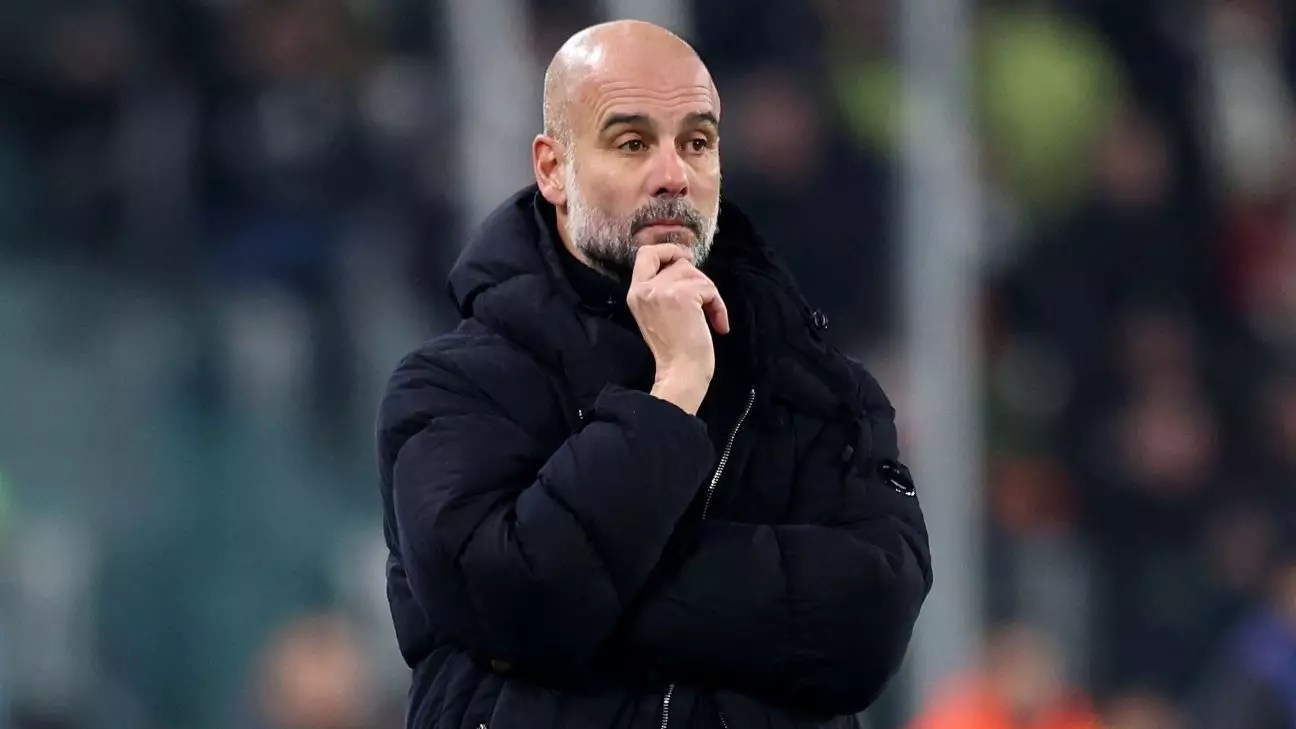The footballing world has been shaken by an unexpected turn of events surrounding Manchester City and their esteemed manager, Pep Guardiola. Once heralded for his tactical genius and success, Guardiola now finds himself in a precarious situation following a string of disheartening performances. The latest setback—a 2-0 defeat to Juventus in the Champions League—has plunged City into an alarming 22nd position, dangerously close to elimination from a competition they once dominated. The question that hangs heavily over the club is whether this marks the beginning of an end to Guardiola’s remarkable tenure.
The backdrop of such unexpected turmoil is startling, particularly when remembering the achievements Guardiola has brought to Manchester City, including a coveted Champions League title in 2023. However, the whispers of doubt have grown louder following this latest loss, reawakening the fears of fans and critics alike about the potential fallout from this crisis.
Guardiola’s demeanor on the touchline during the Juventus match raised eyebrows. Unlike his previous animated and engaged self, he appeared reserved, almost resigned as his team faltered against an opponent that had been struggling in its own right. Actions speak louder than words, and his minimal adjustments throughout the game were concerning for those who have admired his managerial prowess for nearly a decade.
One cannot help but wonder about the implications of Guardiola’s relatively muted leadership. Traditionally, he has been quick to adapt his strategies, often turning the tide of a match with timely substitutions or tactical shifts. Yet, in this crucial encounter, he waited until the late stages to make even a single change, leaving star players like Kevin De Bruyne and Ilkay Gündogan gasping for answers in a midfield that appeared stagnant and worn. The statistical backdrop only emphasizes the depth of the issues at hand: star striker Erling Haaland managed a mere 18 touches throughout the match, leaving fans questioning whether he can still make an impact.
During the post-match conference, Guardiola’s candid admission of self-questioning was unusual—almost uncharacteristic. It signaled a level of vulnerability that fans have rarely seen from him. “Of course I question myself and I have my thoughts,” he stated, but in a manner touched by defiance rather than despair. The underlying agony of experiencing a crisis that is both new and uncomfortable for him cannot be understated; Guardiola has navigated challenges before, but this one feels different.
As he faces mounting pressures, the stakes are higher than ever. The loyalty of City’s ownership to their manager is unquestionable, with the club’s chairman, Khaldoon al-Mubarak, present to witness the disheartening defeat in Turin. While dismissing Guardiola would surely appear reckless given his accomplishments, the long-term trajectory of the team cannot be ignored. As the number of defeats accumulates—seven in ten matches, to be precise—the urgent need for solutions becomes undeniable.
The situation is exacerbated by City’s current league standing, sitting a troubling eight points off the Premier League top spot. Furthermore, the upcoming fixture against Paris Saint-Germain symbolizes a make-or-break moment in their Champions League aspirations. A defeat could leave the club reeling and set off a chain reaction that threatens Guardiola’s grip on his position.
Guardiola himself has acknowledged the profound changes taking place, stating he had viewed this season as potentially his last. However, in light of recent events, he feels a commitment to stay—one driven by loyalty and a desire not to abandon his players in their moment of need. Yet, the question remains as to whether this dedication can translate into improved performances and results.
The disarray surrounding Manchester City extends beyond just tactical issues; it encapsulates a club that once radiated vitality but now seems drained. The players exhibit a lack of the energy and creativity often associated with Guardiola’s teams. The signature attacking flair that characterized City in its prime is conspicuously absent, casting a shadow over their aspirations.
Consequently, supporters must grapple with the unsettling possibility that their team—not just its manager—could find itself out of both the Champions League and perhaps even the title race due to unresolved issues. What once seemed unthinkable now appears disturbingly plausible; Manchester City could miss out on the Champions League knockout stages while Guardiola’s renewed contract could become a mere formality.
As the turmoil unfolds, the ultimate outcome—whether Guardiola can reclaim his position at the pinnacle of football management or whether Manchester City will spiral further into mediocrity—remains uncertain. It’s a narrative that football fans around the globe will be watching closely, eager to see whether the spark of success can be reignited or whether the club will have to face the harsh reality of its current trajectory.


Leave a Reply